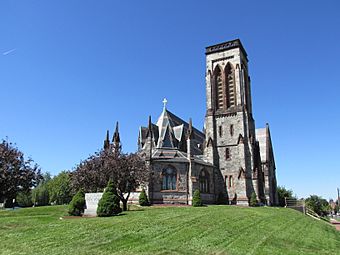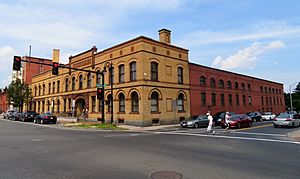Memorial Square District facts for kids
Quick facts for kids |
|
|
Memorial Square District
|
|

Saint George Greek Orthodox Cathedral
|
|
| Location | Springfield, Massachusetts |
|---|---|
| Area | 6.5 acres (2.6 ha) |
| Built | 1866 |
| Architect | Multiple |
| Architectural style | Classical Revival, Queen Anne, Gothic Revival |
| NRHP reference No. | 77000180 |
| Added to NRHP | August 29, 1977 |
The Memorial Square District is a special historic area in Springfield, Massachusetts. It's like the old heart of the Memorial Square neighborhood. Around Memorial Square, where Main and Plainfield Streets meet, you'll find seven important buildings. These include the Memorial Church, which is now Saint George's Greek Orthodox Church. There's also the old Memorial Square Branch Library, which is now a Greek cultural center. This district was added to the National Register of Historic Places in 1977 because of its history and cool architecture.
Contents
Discovering Memorial Square
Today, Memorial Square is a pretty triangular park. It sits where Main and Plainfield Streets come together. Another street, Bradford Street, forms its northern edge. Long ago, in the mid-1800s, this area was filled with big homes. These belonged to important business people and leaders in Springfield.
After the American Civil War, the area started to grow. Memorial Square became a key spot for new buildings. Many of these buildings are still standing today. They tell us about the past of Springfield.
Important Buildings and Their Stories
The buildings around Memorial Square show different styles of architecture. Each one has its own unique history.
The Memorial Church
The Memorial Church is north of the triangular park. It was built in 1866. Famous architects, Richard Upjohn and his son Richard M. Upjohn, designed it. This church is one of the most important buildings in the city. It's known for its beautiful design. Today, it is Saint George's Greek Orthodox Church.
The Old Library
On the west side of the square, you'll find the old library. This building was finished in 1914. Edward Tilton, an architect from New York City, designed it. It's a great example of Italian Renaissance style. Now, it serves as a Greek cultural center.
Buildings on the East Side
There are five buildings in a row on the east side of the square.
- The Trolley Barn: The building furthest south was built in 1897. It was once a trolley barn for the Springfield Street Railway. This company was owned by George Atwater, who had a large estate nearby.
- Memorial Square Building: Next to the trolley barn is the Memorial Square building. It's the tallest building facing the square, with six stories. It was built in 1911 and mainly has homes inside.
- Historic Houses: North of the Memorial Square building are three houses. Two of these are excellent examples of Queen Anne architecture. This style is known for its detailed decorations and varied shapes.
- Former Parish House: The last building is the old parish house for the Memorial Church. It shows the Classical Revival style. This style often uses elements from ancient Greek and Roman buildings.
These buildings together make the Memorial Square District a special place. They help us understand Springfield's past and its growth.




